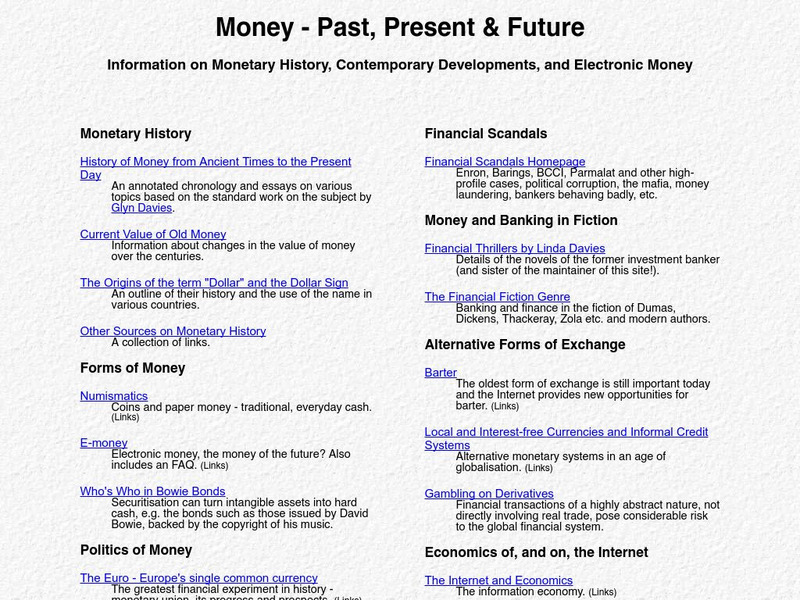Hi, what do you want to do?
Curated OER
The Secret Life of Money Part 2
Students explore how people use money every day and how it is one of the defining resources in our life.
Curated OER
Life of a Dollar Bill
Students examine the basic need for money and the circular flow of resources between households, businesses, government, and financial institutions. They discover how money gets into circulation and how it facilitates the production of...
Curated OER
Barter Day
Students explore trading and bartering. They participate in a Barter Day in which they bring in hand crafted or homemade wares to school to barter with classmates.
Council for Economic Education
You Can BANK On This! (Part 1)
Students investigate the concepts of money management and banking through Internet activities. In this economics lesson plan, students discuss the characteristics of money and how people once bartered with goods instead of paying with...
Curated OER
Budgeting
Sixth graders construct a budget for a family of four including a column for income and no less than ten columns for expenses, all of which will be expressed and totaled in dollar amounts. They are also requested to write a scenario in...
Curated OER
Donut Dinero
Students set up a classroom currency exchange and explore the idea of bartering to get what they want. They create a monetary unit that is based on fractions and multiples of a standard unit, and compare this system to the U.S. monetary...
Curated OER
TRADERS' GAME
Young scholars play a game aimed at demonstrating how relationships with other communities or countries affect the food and fiber system. The game simulates the unequal distribution of natural resources which creates the need for...
Curated OER
Non-Western Economic Values
Learners engage in a game of economic exchange that present a variety of perspectives on wealth. They read scenarios and write a journal response to the scenario. They discuss how we use money in the Western culture and discuss how...
Curated OER
Basic Trading
Students review the basic ideas of exchange. In groups, they discover the incentives for trade and participate in a simulation. They are given a packet of stamps which are worth varying monetary amounts. They discover the concepts of...
Curated OER
Westward Expansion
Fifth graders create a brochure outlining what he or she has studied throughout the unit. The brochure contains evidence that Students have understood and mastered the answers to the essential questions.
Council for Economic Education
Econ Ed Link: Hawaiian Economics: Barter for Fish & Poi
Use this lesson to learn more about the Hawaiian economics system. Learn how they developed and used this specialized type of money system. "In this lesson, you will learn how specialization and division of labor increased productivity...
Council for Economic Education
Econ Ed Link: Hawaiian Economics: Barter for Fish & Poi
In ancient Hawaii, chiefs managed the economy by creating a land division system, the Ahupua'a, which divided the islands into pie slice shapes. Each Ahupua'a covered the three main regions of the islands: the mountains, the valleys, and...
Council for Economic Education
Econ Ed Link: Lewis and Clark Barter With Native Americans
In this lesson plan you will define the term barter and give examples of bartering in several different areas. Find out how this system took shape and was useful to Lewis and Clark. This site is extremely informative and contains...
Council for Economic Education
Econ Ed Link: Money or Barter?
Economics website with interactive lesson teaching students the characteristics of money and barter. Students will be asked to categorize statements as money, barter, or both.
University of Nebraska Omaha
Ec Ed Web: Virtual Economics Web Companion
The Virtual Economics Web Companion for K-12 economics and social studies teachers was created by the National Council on Economic Education. A wide variety of educational materials and lesson plans can be accessed through this site....
Council for Economic Education
Econ Ed Link: I Have No Money, Would You Take a Wampum?
This site teaches students about traditional economies and how exchanges of goods and services were made before money. Students learn about a bater economy which predates our traditional economy.
Council for Economic Education
Econ Ed Link: No Funny Money, Honey I Want the Real Thing!
Do you know what funny money is? It's NOT the real thing! Find out how our government tries to make our money hard to copy in this lesson about real and fake money.
Other
Roy Davies: Money
Explore the past, present, and future of money. Learn about exchange rates, money forms, banking, and more.
Council for Economic Education
Econ Ed Link: Agent Pincher: P Is for Penny or Where Did Money Come From?
What if we woke up tomorrow and found that there were no more pennies? Or what if we found that money had disappeared altogether -- not only from our pockets but from banks, stores and all the other places where we would expect to find...
Council for Economic Education
Econ Ed Link: Why Do We Need Money? Think About Ebay!
The students investigate money--its purpose and functions. They complete an exercise, using the online auction site eBay, to learn why money is critical to an economy.
Council for Economic Education
Econ Ed Link: I Have No Money, Would You Take Wampum?
Through the use of folk tales, history, and the students' own experiences, students will recognize the inter-relatedness of goods, services, money. They will locate information about barter as a means of trade, use folk tales as an...
Council for Economic Education
Econ Ed Link: Bill, Are You Bogus?
In a barter system, people have to trade goods and services for other goods and services. In an economy that produces millions of goods and services, barter is very difficult. Think of all the stuff (goods and services) you have.
Council for Economic Education
Econ Ed Link: Pennies Make Cents
Students will review the history of trade before money and will investigate the history of money. Students will locate information about the first coin authorized by the United States and will learn about the penny.






















